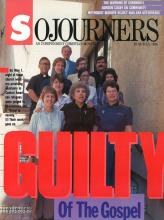SR. DARLENE NICGORSKI lived in Phoenix and was a member of the School Sisters of St. Francis when this interview appeared. She went to Guatemala in 1980 to help establish a preschool but was forced to flee six months later after her pastor was killed. —The Editors
We lack the Bible's inclusive sense, its total concept of who is our neighbor. Our neighbor isn't only those people who speak like us, act like us, and have the same values and economic status as we do. The Bible doesn't say that only when white, middle-class, United States citizens are involved in the process should people become involved. That's a shame, but that's reality, so we have to deal with that. But when they do become involved, they need to understand the full range of involvement and sacrifice. And that what we are doing is nothing compared to the trials of faith borne by the refugees.
Sojourners: What do you think the sanctuary trial is about?
Darlene Nicgorski: I don't see this case really dealing with the issues of sanctuary, because of the limitations of the court. I think this is not only an attempt to silence the truth about Central America and to stop the movement, I really think that the government will particularly try to take on what they consider mainline churches—the Catholic Church, the Presbyterian Church, and other Protestant churches. The Quakers have always been into this sort of stuff, so they're not the same kind of threat. But if the government can, they want to make an example and use this trial not only for its impact on sanctuary but also because the churches are beginning to gain momentum on other issues in which the churches feel themselves in conflict with the government, such as South Africa, the Pledge of Resistance, Witness for Peace, and the peace movement.
The churches' voice on sanctuary and Central America has probably been the clearest voice of any. I think the government has very clearly used this issue as an attempt to intimidate, divide, and separate the churches further for taking a stand that might be opposed to this administration. Doing that with mainline churches is the most effective way to divide administration opponents.
Read the Full Article
